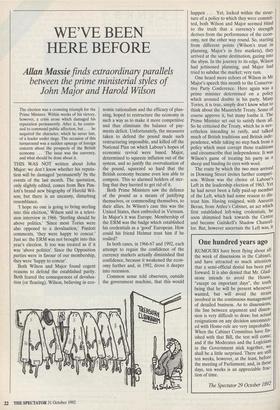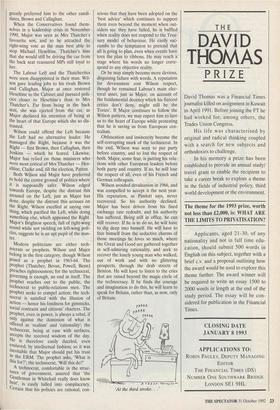WE'VE BEEN HERE BEFORE
Allan Massie finds extraordinary parallels
between the prime ministerial styles of John Major and Harold Wilson
The election was a crowning triumph for the Prime Minister. Within weeks of his victory, however, a crisis arose which damaged his reputation permanently. After it, he contin- ued to command public affection, but ... he acquired the character, which he never lost, of a leader under siege. The occasion of this turnaround was a sudden upsurge of foreign concern about the prospects of the British economy ... The issue was the currency, and what should be done about it.
THIS WAS NOT written about John Major: we don't know whether his reputa- tion will be damaged 'permanently' by the events of the last month. The quotation, only slightly edited, comes from Ben Pim- lott's brand new biography of Harold Wil- son; but there is an uncanny, disturbing resemblance.
`I hope no one is going to bring sterling into this election,' Wilson said in a televi- sion interview in 1966. 'Sterling should be above politics.' Since most Tories were also opposed to a devaluation,' Pimlott comments, 'they were happy to concur.' Just so: the ERM was not brought into this year's election. It too was treated as if it was 'above politics'. Since the Opposition parties were in favour of our membership, they were 'happy to concur'.
Both Wilson and Major found cogent reasons to defend the established parity. Both feared the consequences of devalua- tion (or floating). Wilson, believing in eco- nomic rationalism and the efficacy of plan- ning, hoped to restructure the economy in such a way as to make it more competitive and thus eliminate the balance of pay- ments deficit. Unfortunately, the measures taken to defend the pound made such restructuring impossible, and killed off the National Plan on which Labour's hopes of economic revival were based. Major, determined to squeeze inflation out of the system, and so justify the overvaluation of the pound, squeezed so hard that the British economy became even less able to compete. This so alarmed holders of ster- ling that they hurried to get rid of it.
Both Prime Ministers saw the defence of the pound as a means of justifying themselves, or commending themselves, to their allies. In Wilson's case this was the United States, then embroiled in Vietnam. In Major's it was Europe. Membership of the ERM was the badge which established his credentials as a `good' European. How could his friend Helmut trust him if he resiled?
In both cases, in 1966-67 and 1992, each attempt to regain the confidence of the currency markets actually diminished that confidence, because it weakened the econ- omy further and, in 1992, drove it deeper into recession.
Common sense told observers, outside the government machine, that this would happen . . . Yet, locked within the struc- ture of a policy to which they were commit- ted, both Wilson and Major seemed blind to the truth that a currency's strength derives from the performance of the econ- omy, not the other way round. So, starting from different points (Wilson's trust in planning, Major's in free markets), they arrived at the same destination, gazing into the abyss. In the journey to its edge, Wilson had jettisoned planning, and Major had tried to subdue the market; very rum.
One heard more echoes of Wilson in Mr Major's speech this month to the Conserva- tive Party Conference. Here again was a prime minister determined on a policy which aroused doubts in his party. Many Tories, it is tnie, simply don't know what to think about the Maastricht Treaty. Some of course approve it, but many loathe it. The Prime Minister set out to satisfy them all. So he criticised the Treaty, which he is nev- ertheless intending to ratify, and talked much of British traditions and British inde- pendence, while taking no step back from a policy which must corrupt those traditions and circumscribe that independence. It was Wilson's game of treating his party as a sheep and binding its eyes with wool. The route by which the two men arrived in Downing Street invites further compari- son. Wilson was the choice of Labour's Left in the leadership election of 1963. Yet he had never been a fully paid-up member of the Left, which had some reason to dis- trust him. Having resigned, with Aneurin Bevan, from Attlee's Cabinet, an act which first established left-wing credentials, he soon shimmied back towards the Centre and became Gaitskell's Shadow Chancel- lor. But, however uncertain the Left was, it greatly preferred him to the other candi- dates, Brown and Callaghan.
When the Conservatives found them- selves in a leadership crisis in November 1990, Major was seen as Mrs Thatcher's favourite son, and so he attracted the right-wing vote as the man best able to stop Michael Heseltine. Thatcher's hint that she would still be driving the car from the back seat reassured MPs still loyal to her.
The Labour Left and the Thatcherites were soon disappointed in their man. Wil- son gave leading jobs to his rivals Brown and Callaghan. Major at once restored Heseltine to the Cabinet and pursued poli- cies closer to Hese!tine's than to Mrs Thatcher's. Far from being in the back seat, she was ejected from the car, as Major declared his intention of being at the heart of that Europe which she so dis- trusted.
Wilson could offend the Left because the Left had no alternative leader. He massaged the Right, because it was the Right — first Brown, then Callaghan, then Jenkins — which he feared. Likewise, Major has relied on those ministers who were most critical of Mrs Thatcher — Hes- eltine, Clarke and, till the election, Patten.
Both Wilson and Major have preferred to hold the centre ground of politics where it is supposedly safer. Wilson edged towards Europe, despite the distrust this aroused on the Left, just as Major has done, despite the distrust this arouses on the Right. Wilson excelled at saying one thing, which pacified the Left, while doing something else, which appeased the Right. Major's Brighton speech, full of right-wing sound while not yielding on left-wing poli- cies, suggests he is an apt pupil of the mas- ter.
Modern politicians are either tech- nocrats or prophets. Wilson and Major belong in the -first category, though Wilson Posed as a prophet in 1963-64. The prophet (Thatcher, Bevan, Powell, Benn) preaches righteousness; for the technocrat, governing is enough, an end in itself. The prophet reaches out to the public, the technocrat to public-relations men. The prophet seeks to compel action; the tech- nocrat is satisfied with the illusion of action — hence his fondness for gimmicks, social contracts and citizens' charters. The Prophet, even in power, is always a rebel, if only against the dominion of what is offered as 'realism' and `rationality'; the technocrat, being at ease with surfaces, accepts the received wisdom of the day. He is therefore easily dazzled, even enslaved, by intellectual fashion; so it was inevitable that Major should put his trust in the ERM. The prophet asks, 'What is this for?'; the technocrat, Will this do?' A technocrat, comfortable in the struc- tures of government, assured that 'the Gentleman in Whitehall really does know best', is easily lulled into complacency. Certain that his policies are rational, con- scious that they have been adopted on the `best advice' which continues to support them even beyond the moment when out- siders see they have failed, he is baffled when reality does not respond to the Trea- sury model of behaviour. He easily suc- cumbs to the temptation to pretend that all is going to plan, even when events have torn the plan to ribbons. He may reach a stage where his words no longer corre- spond to any objective reality.
Or he may simply become more devious, disguising failure with words. A reputation for deviousness cost Wilson respect, though he remained Labour's main elec- toral asset, just as Major, on account of the fundamental decency which his fiercest critics don't deny, might still be the Tories'. If Major continues to follow the Wilson pattern, we may expect him to lure us to the heart of Europe while protesting that he is saving us from European cen- tralism.
Obfuscation and insincerity become the self-corrupting mark of the technocrat. In the end, Wilson was seen to put party before country, and so lost the respect of both. Major, some fear, is putting his rela- tions with other European leaders before both party and country. If so, he will lose the respect of all, even of his French and German colleagues.
Wilson avoided devaluation in 1966, and was compelled to accept it the next year. His reputation, as Pimlott says, never recovered. So his authority declined. Major has been driven from his fixed exchange rate redoubt, and his authority has suffered. Being still in office, he can still recover. If he is to do so, he will have to dig deep into himself. He will have to free himself from the seductive charms of those meetings he loves so much, where the Great and Good are gathered together in self-admiring rationality, and seek to recover the lonely young man who walked, out of work and with no glittering prospects, through the drab streets of Brixton. He will have to listen to the cries that are raised beyond the magic circle of the technocracy. If he finds the courage and imagination to do this, he will learn to speak for Britain, rather than, as now, only of Britain.
`At the third stroke...'



























































 Previous page
Previous page